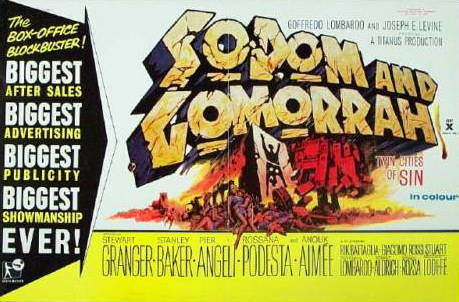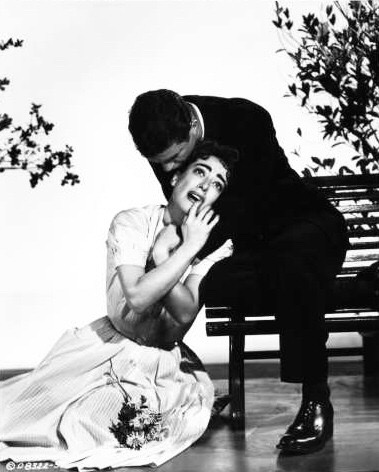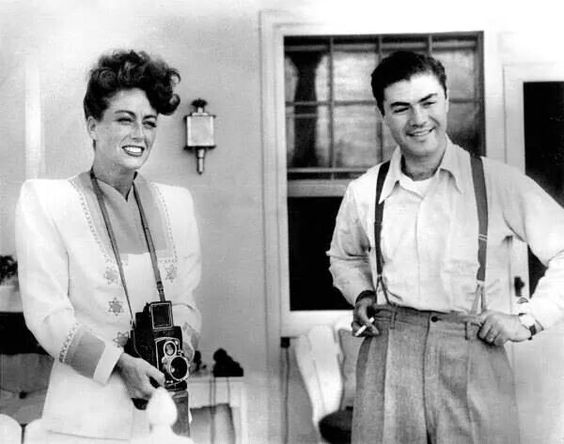In 1956 directed Robert Aldrich surprised everyone by trying his hand at a “woman’s picture,” a melodramatic soap opera that on the surface appeared to be a complete departure from his previous work which included two westerns (Apache, Vera Cruz), a film noir (Kiss Me Deadly) and a drama (The Big Knife), whose emotional volatility equals the physical violence in the three preceding films.
 Autumn Leaves tells the story of Millie Wetherby (Joan Crawford), a lonely, middle-aged spinster who supports herself as a freelance typist, working out of her modest Hollywood bungalow. Except for occasional visits from her landlady (Ruth Donnelly), Millie has no social life or friends and has spent most of her years taking care of an invalid father (shown briefly in flashbacks).
Autumn Leaves tells the story of Millie Wetherby (Joan Crawford), a lonely, middle-aged spinster who supports herself as a freelance typist, working out of her modest Hollywood bungalow. Except for occasional visits from her landlady (Ruth Donnelly), Millie has no social life or friends and has spent most of her years taking care of an invalid father (shown briefly in flashbacks).

Ruth Donnelly (left) and Joan Crawford are featured in a scene from Robert Aldrich’s psychological soap opera, Autumn Leaves (1956).
Suddenly a handsome stranger enters her life. They meet in a diner and Burt (Cliff Robertson), though much younger than Millie, pursues her relentlessly, eventually breaking down her distrust and fear of romantic involvement. Despite her anxiety over being hurt and later rejected by Burt, Millie reluctantly agrees to marry him and for a brief period they are happy. Soon cracks begin to show in Burt’s happy-go-lucky facade along with his constant lies about his job, his family and his past. When his former wife Virginia (Vera Miles) shows up unannounced at the door one day, Millie learns that Burt not only has a history of psychological trauma but that Virginia is romantically involved with Burt’s father (Lorne Greene).

Joan Crawford confronts her father-in-law Lorne Greene in Autumn Leaves (1956), directed by Robert Aldrich.
The path to a happy ending is increasingly rocky and involves a frightening confrontation with an unhinged Burt (wielding a typewriter as a weapon) and a period of rehabilitation in an institution before Millie and Burt can start life anew.

Cliff Robertson plays a charming younger man with a dark side who pursues Joan Crawford romantically in Autumn Leaves (1956).
In Robert Aldrich: Interviews, the director explained why he decided to make Autumn Leaves: “I guess self-survival made me do that one. People were getting pretty collective in their criticism of the violence and anger and wrath in my pictures, although these things were intentional, and I thought it was about time I made a soap opera. I was also a great fan of the Butlers – Jean Rouverol and Hugo Butler – and this was her original story.”
Working with Joan Crawford, however, brought its own challenges as Aldrich quickly noted. “I admired Joan Crawford, who is a “method” actress of her own concoction, but I could not get her to be a drab ageing woman, which threw off the balance of the picture…About a week before work on the picture began, Miss Crawford wanted her own writer to come in and rewrite, which I refused to allow her to do. At two a.m. on the morning before we were due to start shooting I received a phone call saying she wouldn’t be there later that day unless her writer could attend, to which I responded that if her writer showed up we would not shoot. Looking back, I really think that’s the only way you can properly deal with Miss Crawford. The writer didn’t show up but she did, and we proceeded. But she didn’t talk to me for about four or five days. She took direction, she did what she was supposed to do, but there was no personal communication. Then one day she was doing a scene terribly effectively: I forget which one. I was really touched, and when she looked up after finishing it I tried not to be obvious in wiping away a tear. That broke the ice, and from then on we were good friends for a long time.”

Joan Crawford is troubled by her relationship with a younger man in Autumn Leaves (1956), directed by Robert Aldrich.
By 1956 Crawford was no longer the major star she had been at MGM and Warner Bros. but that didn’t stop her from behaving like a diva with most of the cast and crew. Writer Bob Sherman, who was hired as the dialogue coach on Autumn Leaves recalled meeting her for the first time in Shaun Considine’s biography, Bette & Joan: “Bob Aldrich, the director, asked me if I’d go out to Crawford’s house on a Sunday afternoon, to go over the script with her,” said Sherman. “When I got there, I was ushered through the living room, with the white couch and white pillows and white rugs. At the back of the house, two little girls dressed in their white crinoline dresses, playing with two white French poodles. Mister Pepsi-Cola [Al Steele] was standing by the Greek white pool area, with two white pool houses on each side. And then I saw Joan. She was lying on a white chaise lounge, wearing sunglasses, having a manicure and a pedicure while dictating letters to a secretary sitting on one side. She patted a chair on her other side and I sat there, reading lines to her whenever she had a moment to spare. She was playing the ‘executive-actress’ to the hilt.”

Joan Crawford invites Cliff Robertson for a swim in the ocean in Autumn Leaves (1956) featuring the famous theme song by Nat King Cole.
Even Cliff Robertson – Autumn Leaves was his first leading role after a supporting part in Picnic (1955) – was personally “auditioned” by Crawford at her home prior to filming. But he felt empathy and respect for the fiercely determined actress. In Donald’s biography Possessed: The Life of Joan Crawford, Robertson says, “I think she felt fraudulent precisely because she had crossed the railroad tracks – had come up from nothing – and that therefore she felt she wasn’t the real thing because she was just ‘acting.’ But Joan was the real thing.”
Joan was equally complimentary of Robertson exclaiming he was, “stunning; very few actor could have brought that kind of credibility to such a demanding part. His mad scenes can’t be topped.”

Vera Miles (right) confronts Joan Crawford with the truth about her young, unstable husband in Autumn Leaves (1956).
As for her female co-star Vera Miles, Crawford was equally complimentary and supportive, despite her reputation for often treating younger actresses with disdain. “There is an actress in this picture, also gifted, who truly deserved a wonderful career and great parts,” told biographer Charlotte Chandler years later in Not the Girl Next Door: Joan Crawford, A Personal Biography. “Vera Miles had the looks and she’s a real actress. She’s had a good career, but she deserved even more.”
After Crawford’s initial standoff with Aldrich for scriptwriters, the Autumn Leaves shoot proceeded smoothly though Joan did persist in antagonizing her director over his choice of soft drinks. He “liked to drink Coke out of a paper cup,” said photographer Phil Stern. “When he had a case of the stuff brought in, Joan had a Pepsi vending machine set up. Every time his back was turned, she used to throw out his Coke and replace it with Pepsi.” Aldrich eventually put a stop to this but Joan continued to extol the virtues of drinking Pepsi to anyone who would listen.  When Autumn Leaves was released, the critics were divided over its merits but it was a modest box office hit that scored well with mostly female moviegoers. Bosley Crowther of The New York Times was particularly uncomplimentary and set a sour note with the introductory paragraph that announced, “This dismal tale wrenched from Dr. Freud’s notebooks fluttered down at the Astor yesterday.” After laying out the basic plot, he dismissed the contributions of Aldrich, Crawford and Robertson: “The situation is valid—in its basic circumstances, anyhow—but it couldn’t have been handled less considerately or convincingly without the whole thing’s becoming utter farce. As a matter of fact, Miss Crawford’s acting often touches absurdity…Under these trying conditions, Cliff Robertson’s performance as the boy is a jumble of poignant awkwardness and embarrassing idiocies. His schizophrenic condition must adjust to the histrionic requirements of the heroine.” Crowther even manages to denigrate the popular theme song with this dismissive comment: “…at the beginning and at the end, the singer Nat (King) Cole, gives a soggy sound-track rendering of the ballad “Autumn Leaves.”
When Autumn Leaves was released, the critics were divided over its merits but it was a modest box office hit that scored well with mostly female moviegoers. Bosley Crowther of The New York Times was particularly uncomplimentary and set a sour note with the introductory paragraph that announced, “This dismal tale wrenched from Dr. Freud’s notebooks fluttered down at the Astor yesterday.” After laying out the basic plot, he dismissed the contributions of Aldrich, Crawford and Robertson: “The situation is valid—in its basic circumstances, anyhow—but it couldn’t have been handled less considerately or convincingly without the whole thing’s becoming utter farce. As a matter of fact, Miss Crawford’s acting often touches absurdity…Under these trying conditions, Cliff Robertson’s performance as the boy is a jumble of poignant awkwardness and embarrassing idiocies. His schizophrenic condition must adjust to the histrionic requirements of the heroine.” Crowther even manages to denigrate the popular theme song with this dismissive comment: “…at the beginning and at the end, the singer Nat (King) Cole, gives a soggy sound-track rendering of the ballad “Autumn Leaves.”

One of the more intense encounters between Joan Crawford and Cliff Robertson in Robert Aldrich’s melodrama, Autumn Leaves (1956).
Autumn Leaves now stands as one of Crawford’s best films of the fifties, along with Sudden Fear (1952) and Johnny Guitar (1954), and it became a personal favorite of hers as well. She deemed it the “best older woman/younger man movie ever made,” adding, “Everything clicked on Autumn Leaves. The cast was perfect, the script was good, and I think Bob [Aldrich] handled everything well. I really think Cliff did a stupendous job; another actor might have been spitting out his lines and chewing the scenery, but he avoided that trap. I think the movie on a whole was a lot better than some of the romantic movies I did in the past…but somehow it just never became better known. It was eclipsed by the picture I did with Bette Davis.”  Autumn Leaves has clearly grown in stature over the years among film critics and admirers of Aldrich’s work. Film critic and former director of the New York Film Festival Richard Roud described it as an “extraordinary combination of domestic Guignol and elephantised soap opera” while Paul Taylor in TimeOut Film Guide describes it as “a seemingly eccentric, but in fact characteristic Aldrich film: cutting a radical cinematic swathe through weepie material.”
Autumn Leaves has clearly grown in stature over the years among film critics and admirers of Aldrich’s work. Film critic and former director of the New York Film Festival Richard Roud described it as an “extraordinary combination of domestic Guignol and elephantised soap opera” while Paul Taylor in TimeOut Film Guide describes it as “a seemingly eccentric, but in fact characteristic Aldrich film: cutting a radical cinematic swathe through weepie material.”

Joan Crawford and Cliff Robertson star in a neurotic variation on the older woman-younger man romantic drama – Autumn Leaves (1956).
Probably the most perceptive critique is Dan Callahan’s for Slant magazine, which states “All of Aldrich’s early work is intriguing, but Autumn Leaves is his secret gem. It’s been passed over as camp because of its star, Joan Crawford, but Aldrich brings all his hard edges to this woman’s picture. The collision of his tough style with the soapy material makes for a film that never loses its queasy tension…The real theme of Autumn Leaves is not loneliness, but incest…If photographer Diane Arbus felt that all families are creepy, Autumn Leaves proves that such creepiness persists in the most unlikely places.”
Autumn Leaves might not have won any Oscar nominations but Aldrich did win the Best Director award at the Berlin International Film Festival for his efforts. Unfortunately, he never was acknowledged by the Academy for any of his work but his peers, the Directors Guild of America, honored him with “Outstanding Directorial Achievement” nominations for What Ever Happened to Baby Jane? and The Dirty Dozen.  Aldrich would follow Autumn Leaves with a return to male-oriented genre films starting with Attack (1956), a grim WWII drama – starring Jack Palance (Joan’s future co-star in Sudden Fear), Eddie Albert and Lee Marvin – which Peter Cowie praised in his film history anthology, Eighty Years of Cinema, as “a biting study of disloyalty, cowardice and incompetence.” rom
Aldrich would follow Autumn Leaves with a return to male-oriented genre films starting with Attack (1956), a grim WWII drama – starring Jack Palance (Joan’s future co-star in Sudden Fear), Eddie Albert and Lee Marvin – which Peter Cowie praised in his film history anthology, Eighty Years of Cinema, as “a biting study of disloyalty, cowardice and incompetence.” rom

(From left to right) Jack Palance, Buddy Ebsen and Robert Strauss star in Robert Aldrich’s WW2 drama, Attack (1956).
Additional Trivia:
Joan Crawford originally wanted Marlon Brando for the role of Burt which he refused.
The original title of the film was The Way We Are but was changed to capitalize on the success of Nat King Cole’s song, “Autumn Leaves”, the movie’s theme song.
Actress Jean Rouverol and husband screenwriter Hugo Butler were investigated by HUAC as communists during the early fifties and eventually fled to Mexico with their four children and stayed there 13 years. Robert Aldrich was one of the few directors to give them work during the Blacklist era. The couple’s co-writing credits on Autumn Leaves appear as Jack Jevne, their “front.” They would be credited with their real names on the screenplay for Aldrich’s The Legend of Lylah Clare and Butler would also pen the screenplay for Aldrich’s Sodom and Gomorrah.  *This is a revised and expanded version of an article that first appeared on the Turner Classic Movies website.
*This is a revised and expanded version of an article that first appeared on the Turner Classic Movies website.
Other links of interest:
http://javabeanrush.blogspot.com/2015/09/autumn-leaves-1956-w-joan-crawford.html
http://www.slantmagazine.com/film/review/autumn-leaves
https://josmarlopes.wordpress.com/2014/10/18/autumn-leaves-a-song-for-all-seasons/
http://eddieonfilm.blogspot.com/2011/09/cliff-robertson-1923-2011.html
https://www.theguardian.com/film/2011/sep/11/cliff-robertson-obituary
http://thehollywoodart.blogspot.com/2008/08/joan-crawford-appreciation-part-ii.html
https://www.youtube.com/watch?v=ZaOCyLsMW1Q




